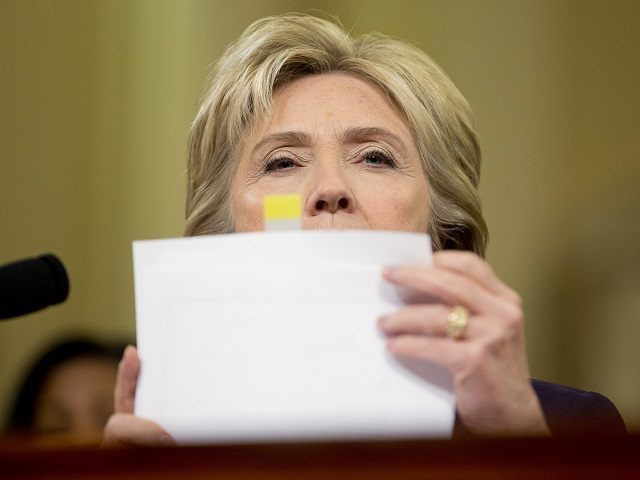If one wants context on how to judge Hillary Clinton’s testimony before the Benghazi Select Committee, it helps to know history. Hillary Clinton has a history of lying under oath.
Recently, we filed a Freedom of Information Act (FOIA) lawsuit against the National Archives and Records Administration (NARA) in the U.S. District Court for District of Columbia seeking access to draft indictments of Hillary Clinton in the Whitewater scandal. The National Archives confirmed that draft indictments of Mrs. Clinton exist but refused to release the records, evidently in order to protect Mrs. Clinton’s alleged privacy in these law enforcement records. I suspect you agree with us that Hillary Clinton’s “privacy” trumps your right to know.
On March 9, 2015, Judicial Watch submitted a FOIA request seeking all draft indictments of Mrs. Clinton in the files of Hickman Ewing, Jr., who served as Deputy Independent Counsel from September 1994 – January 2001. In 1999, Ewing testified that he wrote a draft indictment of Mrs. Clinton in 1996. Here’s what happened next.
On March 19, the National Archives admitted locating records responsive to the request, confirming that it found 38 pages of responsive records in a folder entitled “Draft Indictment,” and approximately 200 pages of responsive records in a folder entitled “Hilary Rodham Clinton/Webster L. Hubbell Draft Indictment.”
But our request was denied in full under Exemption (b)(7)(C), which, if used appropriately, provides protection for law enforcement information, the disclosure of which could reasonably be expected to constitute an unwarranted invasion of personal privacy. Getting ahold of these records would only be an “unwarranted invasion of privacy” in some alternate universe, not in the reality where Hillary Clinton is the most famous woman in America and seeking the presidency.
Following the rules, we administratively appealed the denial on May 14. Literally on the day we prepared to file the lawsuit (five months later), we finally received a response from the National Archives that acknowledges receipt of the administrative appeal, but makes no determination on the refusal to release the draft indictments. Five months and the result of the “administrative” appeal? No answer! You can see why we are now in court.
It is our understanding that the Hillary Clinton indictment records include an evolving set of draft indictments, written between 1996 and 1998. The draft indictments reportedly arose out of the Office of Independent Counsel investigation into Mrs. Clinton’s involvement in an allegedly fraudulent transaction, Castle Grande, involving the assets of Madison Guaranty Savings & Loan.
Mrs. Clinton was alleged to have drafted an option agreement that concealed from federal bank examiners a fraudulent $300,000 cross-loan to the Castle Grande project. Mrs. Clinton’s grand jury testimony – and her alleged concealment of her role in this fraudulent transaction, including the hiding of her Rose Law Firm billing records concerning her legal work for Madison – reportedly became the subject of an obstruction of justice and perjury investigation.
In March 1999, Ewing testified that three years prior he had drafted and circulated but abandoned an indictment of Mrs. Clinton. The New York Post reported:
Ewing said he “had problems” with some of her statements to investigators in April 1995 and drafted an indictment shortly after September 1996. He said he showed it to other prosecutors in Starr’s office but went no further.
Our discovery of the Clinton draft indictment in the National Archives (“America’s attic”) caused Mrs. Clinton to blow a gasket. Her spokesman went into attack mode (via Politico):
Clinton’s campaign dismissed the request as a cheap ploy.
“Trey Gowdy’s discredited investigation is forcing right-wing groups to resort to the ultimate of dead horses from the Ken Starr era to keep up their partisan attacks on Hillary Clinton,” Clinton campaign spokesman Brian Fallon said.
Judicial Watch isn’t partisan, and the Clinton gang knows this. Lies to cover lies. If the draft indictment is baseless, then I suppose Mrs. Clinton will waive her alleged privacy interests and endorse its release so the American people can judge for themselves. This is unlikely.
Hillary Clinton’s privacy doesn’t trump the public’s interest in knowing more about whether she obstructed justice and lied to a federal grand jury.

COMMENTS
Please let us know if you're having issues with commenting.